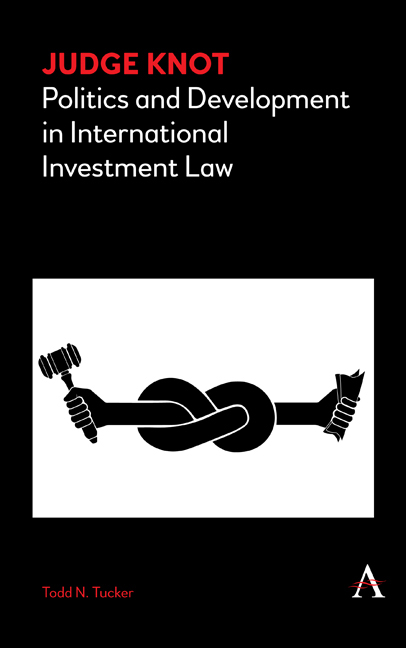Book contents
- Frontmatter
- Dedication
- Contents
- List of Illustrations
- Acknowledgments
- Introduction
- Chapter One Entering the Judge Knot
- Chapter Two Historicizing Investment Law
- Chapter Three Why Investors Demand Investment Law
- Chapter Four Why Arbitrators Supply Investment Law
- Chapter Five Why Investment Law Lasts
- Chapter Six Toward Global Popular Constitutionalism
- Appendix Methodology
- Index
- Frontmatter
- Dedication
- Contents
- List of Illustrations
- Acknowledgments
- Introduction
- Chapter One Entering the Judge Knot
- Chapter Two Historicizing Investment Law
- Chapter Three Why Investors Demand Investment Law
- Chapter Four Why Arbitrators Supply Investment Law
- Chapter Five Why Investment Law Lasts
- Chapter Six Toward Global Popular Constitutionalism
- Appendix Methodology
- Index
Summary
Judge not, lest ye may be judged
For the judgment ye judge ye shall surely be judged, you gets no love
—KRS OneSince classical times, international law has focused on restraining states’ freedom of action on the global and regional stages, from setting rules on protection of diplomats to ensuring non- interference with commerce on the high seas.
In recent decades, however, international legal constraints have shifted far behind national borders. Multilateral lending institutions’ structural adjustment programs require sovereign nations to slash budgets, privatize public enterprises and cut pensions. Tax treaties limit how and when countries can collect revenue from multinational business enterprises operating in their borders. Trade agreements have shifted from simply locking in low tariffs to forbidding policies that today's rich countries once deployed to climb up the economic developmental ladder themselves. And all of these constraints are backed up by developed countries’ bilateral foreign- aid programs.
One newly controversial instrument in this arsenal is the investor– state disputesettlement (ISDS) system contained in thousands of trade and investment treaties. Its defining feature: allowing foreign investors to sue host states outside of national courts before transnational tribunals. These disputes are triggered by multinational companies that are unhappy with host- state regulations. The tribunals themselves are comprised of arbitrators hired by the litigating company and country on a case- by- case basis. Corporations have employed this dispute- settlement instrument to launch aggressive claims against states over environmental conservation, financial stabilization and publicservice provisions.
Since a tribunal issued the first investment treaty award in 1990, more than 700 investor– state dispute- settlement lawsuits have been launched—most of them in just the past few years. And criticisms of the system are growing in number. The online newssite BuzzFeed ran a four- part investigative series by Pulitzer Prize– winning author Chris Hanby, titled “Global Super Court: The Secret Threat That Makes Companies More Powerful than Countries” (Hanby 2016a). Time magazine's Washington correspondent Haley Edwards published a popular book for Columbia Global Reports, called Shadow Courts: The Tribunals That Rule Global Trade (Edwards 2016). New York Times now regularly runs articles on developments in ISDS practices, featuring titles such as “Trans- Pacific Partnership Seen as Door for Foreign Suits Against U.S.” (Weisman 2015).
- Type
- Chapter
- Information
- Judge KnotPolitics and Development in International Investment Law, pp. 1 - 6Publisher: Anthem PressPrint publication year: 2018



